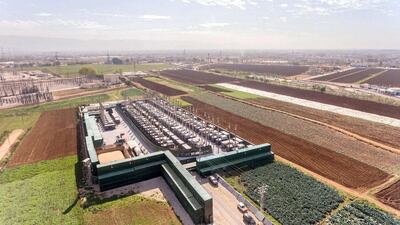Lebanon’s fourth-largest city will enjoy uninterrupted electricity supply in a country marred by daily power cuts after Parliament voted to extend the contract of the private company managing the state-owned grid in the capital of the Bekaa Valley.
The bill passed on Monday extends Electricite de Zahle's (EDZ) contract with state-owned Electricite du Liban (EDL) for two years while allowing bids from other companies when it comes up for renewal.
The approval of the legislation put forward by Parliament’s Public Works Committee will keep the lights on in Zahle and 17 surrounding villages.
Electricity in Lebanon has been an issue since the end of the country’s 15-year civil war in 1990. Most Lebanese households get three to six hours of electricity a day through EDL, which charges subsidised rates that cost the treasury an annual $1.5 billion. To make up the shortfall, Lebanese must pay local private operators of generator sets.
Since installing its own power generators in 2015, EDZ has been able to provide 24-hour electricity to the 300,000 residents of the Bekaa Valley through the state-owned grid.
Today, EDZ buys electricity from EDL and manages its distribution through the state-owned grid while turning on its own power-generating plants during daily scheduled power cuts to maintain an uninterrupted supply.
Despite the renewal of the contract, EDZ, similar to EDL, faces another challenge as Lebanon's dwindling foreign currency reserves threaten the import of fuel for power plants.
A Lebanese delegation visited Iraq on Monday to secure fuel imports next year once a controversial government contract with the current Algerian supplier expires.
Iraq's oil minister Ihsan Abdul Jabbar said an agreement was reached to start fuel export supplies to Beirut in 2021 using global prices, Reuters reported.
The announcement came after a meeting between Mr Jabbar and his Lebanese counterpart Raymond Ghajar in Baghdad.
Mr Jabbar said the quantity of fuel to be supplied will be "limited and to be announced later" and would cover part of Lebanon's needs to generate power, according to an oil ministry statement seen by Reuters.
Mr Ghajar said it was agreed to import fuel oil from Iraq to cover the requirements of Lebanese power stations, according to the oil ministry.
It is unclear how Lebanon will secure the funds to pay for the fuel imports.

